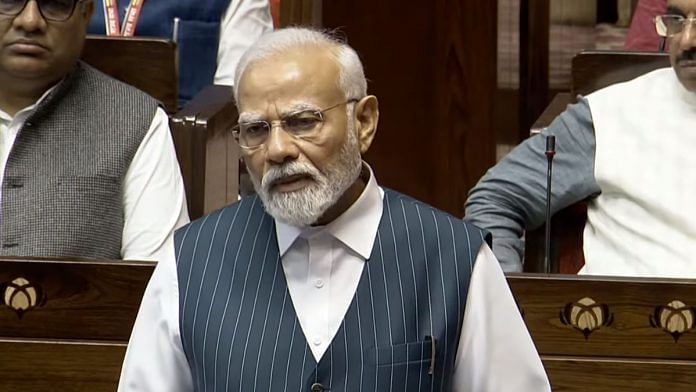New Delhi: Paving the way for one-third reservation for women in the Lok Sabha and state assemblies, the government Tuesday tabled the Women’s Reservation Bill in the Lower House. But this reservation is likely to come into effect in 2029 and not by the time of the general elections next year even if the bill gets parliamentary approval during the 17th Lok Sabha.
Shortly before the bill was introduced in the Lok Sabha Tuesday, Prime Minister Narendra Modi informed the House about the Union Cabinet’s approval for the Nari Shakti Vandan Adhiniyam, issued the previous evening.
“Perhaps God has chosen me for this sacred work, to empower women and harness their power. Once again, our government has taken steps in this direction,” he said.
The proposed legislation, tabled as the 128th Amendment Bill, 2023, provides for the implementation of reservation for women after a delimitation exercise, based on the figures of the first census undertaken post the bill receiving parliamentary assent, is conducted.
Though the bill proposes quota within quota, it is only for women from Scheduled Castes (SCs) and Scheduled Tribes (STs), not from Other Backward Classes (OBCs). This was among the many contentious issues that hampered attempts by past governments to introduce reservation for women in the legislature — United Front governments led by H.D. Deve Gowda and Inder Kumar Gujral in 1996 and 1997, respectively, NDA governments led by Atal Bihari Vajpayee in 1998 and 1999, and the Manmohan Singh-led UPA government in 2010.
In 2010, the Rajya Sabha passed the bill but the UPA government let it lapse in the Lok Sabha despite having the numbers, given that they had the support of the Bharatiya Janata Party (BJP) and the Left on this issue.
With their demand for OBC quota within the 33 percent quota for women in the Lok Sabha and state assemblies, Samajwadi Party (SP) and Rashtriya Janata Dal (RJD) emerged as the most vocal opponents of the bill.
Articles 330A, 332A & 334A
The bill seeks to insert three new Articles (330A, 332A and 334A) in the Constitution, after Articles 330, 332 and 334, which provide for reservation of seats for SCs and STs in the Lok Sabha, and state assemblies, and the cessation of reservation of seats after a certain period, respectively.
Subclause 2 of Article 330A proposes to reserve one-third of the total number of seats reserved for SCs and STs in the Lok Sabha for women from the SC and ST communities.
Similarly, subclause 3 of Article 330A proposes to reserve one-third (including the number of seats reserved for women from SC/ST communities) of the total number of seats in the Lok Sabha for women.
Subclause 2 and 3 of the proposed Article 332A propose similar provisions for state assemblies, while subclauses 2, 3 and 4 of the proposed Article 334A refer to similar provisions for the legislative assembly of Delhi and rotation of seats reserved for women.
Speaking about the Women’s Reservation Bill Tuesday, Modi said “such milestones come in the development journey of every country, when it proudly says that today we all have created a new history”.
In his first speech in the new Parliament building, the Prime Minister added, “Just talking about women’s development is not enough. If we have to achieve new milestones in the development journey of mankind, if we have to achieve new destinations in the development journey of the nation, then it is necessary that we lay emphasis on women-led development.”
नारी शक्ति वंदन अधिनियम के माध्यम से हमारा लोकतंत्र और मजबूत होगा। यह विधेयक लोकसभा और विधानसभा में महिलाओं की भागीदारी का विस्तार करने का है। pic.twitter.com/jyPnM4dv6J
— Narendra Modi (@narendramodi) September 19, 2023
He also recounted the efforts of previous BJP-led governments to introduce reservation for women in the legislature.
“There have been many discussions and debates on women’s reservation for many years. The bill related to this was introduced for the first time in 1996. The Women’s Reservation Bill was introduced several times during Atal ji‘s tenure, but the government could not gather the numbers to pass it and so that dream remained unfulfilled,” he said.
Women, Modi said, are “moving forward in every sector which is why it is very important that in policy-making too, our women, our mothers and sisters also play their part”.
He added that women’s contributions must not be limited and that they must also play an important role in policy-making. “In a democracy, the use of politics, policy and power is a great medium for bringing about effective change in society. Therefore, be it space or sports, startups or SHGs (self-help groups), the world is seeing the strength of Indian women in every field,” said the Prime Minister.
Seeking the support of all political parties to ensure that the bill clears Parliament with a unanimous vote, Modi said reservation for women in the legislature will “strengthen democracy”.
(Edited by Amrtansh Arora)



